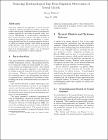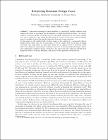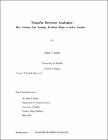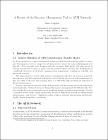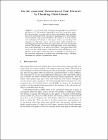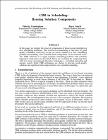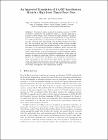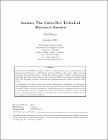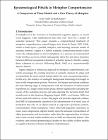Browsing Computer Science Technical Reports by Date of Publication
Now showing items 21-40 of 280
-
Removing Epistemological Bias From Empirical Observation of Neural Networks
(Trinity College Dublin, Department of Computer Science, 1994-05-25)This paper addresses the application of neural network research to a theory of autonomous systems. Neural networks, while enjoying considerable success in autonomous systems applications, have failed to provide a firm ... -
Analogical Asides on Case-Based Reasoning
(Trinity College Dublin, Department of Computer Science, 1994-09)This paper explores some of the similarities and differences between cognitive models of analogy and case-based reasoning systems. I first point out a paradox in the treatment of adaptation in analogy and in case-based ... -
Physical Model Generation in PDE Analysis using Model-based Case-based Reasoning
(Trinity College Dublin, Department of Computer Science, 1994-11)Model generation has emerged as a key task in engineering design and analysis. AI research in this area has focused on model based reasoning emphasising qualitative models in attempting to automate this process. In this ... -
Retrieving Reusable Design Cases: Exploiting Adaptation Knowledge in Design Reuse
(Trinity College Dublin, Department of Computer Science, 1994-11)Case-based reasoning has been identified as a potentially fruitful candidate technology with which to investigate the development of automated design systems. Two critical stages in case-based design are design retrieval ... -
On the Limitations of Memory Based Reasoning
(Trinity College Dublin, Department of Computer Science, 1994-11)Memory-Based Reasoning (MBR) represents a radical new departure in AI research. Whereas work in symbolic AI is based on inference and knowledge representation MBR depends on using a large memory of examples as a reasoning ... -
A Comparison of Incremental Case-Based Reasoning and Inductive Learning
(Trinity College Dublin, Department of Computer Science, 1994-11)This paper focuses on problems where the reuse of old solutions seems appropriate but the conventional CBR methodology is not adequate because a complete description of the new problem is not available to trigger ... -
Bezier Curves for Camera Motion
(Trinity College Dublin, Department of Computer Science, 1994-12)This paper describes an attempt to address some of the deficiencies and infelicities associated with the use of piecewise Bezier segments when constructing a smooth path for a camera in a computer animation. In particular, ... -
Experiments in Adaptation-Guided Retrieval in Case-Based Design
(Trinity College Dublin, Department of Computer Science, 1994-12)Case-based reasoning (CBR) has been applied with some success to complex planning and design tasks. In such systems, the best case is retrieved and adapted to solve a particular target problem. In general, the best case ... -
A Comparison of Model-Based and Incremental Case-Based Approaches to Electronic Fault Diagnosis
(Trinity College Dublin, Department of Computer Science, 1994-12)CBR seems well suited to fault diagnosis because diagnostic episodes naturally form cases and much of expert competence seems to be based on reuse of old solutions. However, in many diagnosis problems it is difficult ... -
Transfer Between Analogies: How Solving One Analogy Problem Helps to Solve Another
(Trinity College Dublin, Department of Computer Science, 1995-04)This paper deals with transfer between analogies; with what people acquire from one analogy problem-solving episode that can be re-applied to a subsequent analogy, problem-solving episode. This issue must be resolved if ... -
A Review of the Resource Management Task in ATM Networks
(Trinity College Dublin, Department of Computer Science, 1995-04)[Introduction] An ATM network is a connection-oriented, packet-switched network with the ability to transport heterogeneous services irrespective of characteristics across the same underlying physical network. ATM networks ... -
On Order Effects in Analogical Mapping: Predicting Human Error Using IAM
(Trinity College Dublin, Department of Computer Science, 1995-04)The Incremental Analogy Machine (IAM) predicts that the order in which parts of an analogy are processed can affect the ease of analogical mapping. In this paper, the predictions of this model are tested in two ... -
On the Automatic Generation of Case Libraries by Chunking Chess Games
(Trinity College Dublin, Department of Computer Science, 1995-05)As a research topic computer game playing has contributed problems to AI that manifest exponential growth in the problem space. For the most part, in games such as chess and checkers these problems have been surmounted ... -
CBR in Scheduling: Reusing Solution Components
(Trinity College Dublin, Department of Computer Science, 1995-06)In this paper we explore the reuse of components of known good schedules in new scheduling problems. This involves accumulating a case-base of good quality schedules, retrieving a case (or cases) similar to a new ... -
On the use of CBR in optimisation problems such as the TSP
(Trinity College Dublin, Department of Computer Science, 1995-06)The particular strength of CBR is normally considered to be its use in weak theory domains where solution quality is compiled into cases and is reusable. In this paper we explore an alternative use of CBR in optimisati ... -
An Improved Translation of SA/RT Specification Model to High-Level Timed Petri Nets
(Trinity College Dublin, Department of Computer Science, 1995-10)Structured analysis methods for real-time systems (SA/RT) are widely accepted by the industrial world as a mature approach to real-time systems design. These methods use highly expressive graphical specification languages ... -
Aontas: The CaberNet Technical Abstracts Service
(Trinity College Dublin, Department of Computer Science, 1995-10)CaberNet is the ESPRIT network of excellence in distributed systems consisting of several European research groups. CaberNet has industrial affiliates who receive regular information about the research activities of ... -
On Adaptation in Analogy
(Trinity College Dublin, Department of Computer Science, 1995-12)When people use analogies to solve problems they form an analogical mapping between two domains of knowledge. This mapping may support inferences by analogy that suggest a novel solution to a problem. Several factors ... -
Epistemological Pitfalls in Metaphor Comprehension: A Comparison of Three Models and a New Theory of Metaphor
(Trinity College Dublin, Department of Computer Science, 1995-12)[Introduction] If metaphor is to be viewed as a fundamental cognitive agency, as recent work suggests, what ramifications does this view have for a model of semantic memory? This paper presents a computational treatment ...




